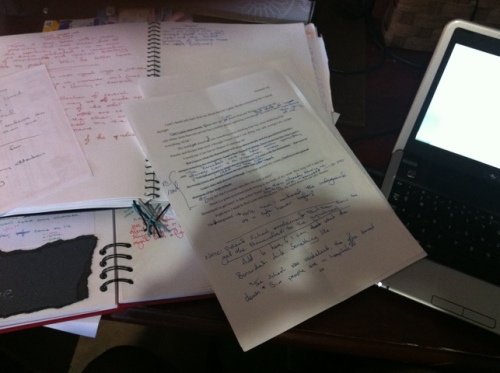I can point this out in the work of others more easily than in my own and as i say it so often i honestly thought i was doing it until last week. With the first chapter of my WIP on absolute write for some feedback i received a crit which highlighted four consecutive sentences and pointed out which one was showing, which was telling, which was over telling then back to showing… wow do i write like that? Yes it was all me and the reader was right – i just couldn’t see it.
So i went back to page one and tried to rework the sentences that were telling and cut those that were over telling… with no luck. I couldn’t see which one’s were worded wrong or presented from the wrong point of view.
So my task for me today is to hunt down some more information on the showing v telling battle and create or find some exercises that making spotting the difference easy in my own work.
Fist things first, it’s called using ‘Figurative Language’ here’s some examples from: http://www.writedesignonline.com/assignments/shownottell.html :
Telling: It was foggy.
Showing:
The yellow fog that rubs its back upon the window-panes
The yellow smoke that rubs its muzzle on the window-panes
Licked its tongue into the corners of the evening,
Lingered upon the pools that stand in drains,
Let fall upon its back the soot that falls from chimneys,
Slipped by the terrace, made a sudden leap,
And seeing that it was a soft October night,
Curled once about the house, and fell asleep.
– excerpt from “The Love Song of J. Alfred Prufrock” by T.S. Eliot
Telling: The trees are bent over from the heavy ice.
Showing:
When I see birches bend to left and right
Across the lines of straighter darker trees,
I like to think some boy’s been swinging them.
But swinging doesn’t bend them down to stay.
As ice-storms do. Often you must have seen them
Loaded with ice a sunny winter morning
After a rain. They click upon themselves
As the breeze rises, and turn many-colored
As the stir cracks and crazes their enamel.
Soon the sun’s warmth makes them shed crystal shells
Shattering and avalanching on the snow-crust
Such heaps of broken glass to sweep away
You’d think the inner dome of heaven had fallen.
They are dragged to the withered bracken by the load,
And they seem not to break; though once they are bowed
So low for long, they never right themselves:
You may see their trunks arching in the woods
Years afterwards, trailing their leaves on the ground
Like girls on hands and knees that throw their hair|
Before them over their heads to dry in the sun.
– excerpt from “Birches” by Robert Frost
Telling: The woman is pregnant. | Top
Showing: “Metaphors”
I’m a riddle in nine syllables,
An elephant, a ponderous house,
A melon strolling on two tendrils.
O red fruit, ivory, fine timbers!
This loaf’s big with its yeasty rising.
Money’s new-minted in this fat purse.
I’m a means, a stage, a cow in calf.
I’ve eaten a bag of green apples,
Boarded the train there’s no getting off.
– Sylvia Plath
There’s probably a lot of people going, ‘i knew that’, but i’m shocking with remembering these kinds of details.
So what about the other specifics we learned in primary school. Here’s a good refresher from:
http://www.missspott.com/figurativelanguage.html
Figurative Language is the use of words that go beyond their ordinary meaning. It requires you to use your imagination to figure out the author’s meaning. For example, if someone tells you that it is raining cats and dogs, you know that there are not actually cats and dogs falling from the sky. You know it reallymeans that it is raining very hard.
The PSSA evaluates students’ ability to figure out such language. There are several terms you should be familiar with to have a better understanding of each.
They are:
Alliteration Metaphor
Hyperbole Personification
Idiom Simile
Feel like a school student again? I do.
Now for the practical stuff, grab your manuscript:
Words that often occur when showing are: like and as. Words that could point out a telling sentence: i guess anytime you directly point out the thing/person in the spotlight. So too many he, she, me, my and I’s or your sentence could be popped straight into an instruction manual or recount. My first sentence is ‘I ache from top to toe.’ very straight forward, clear cut and instructive on my mc’s feelings. i now want to rip it to shreds.
ways to restructure your sentences: (metonymy) use one word to mean a greater concept or group and (personification) use any noun as if it were a person or persons.
‘The world throbs in echo of the way my body feels.’ Better? Maybe i’m going to keep working on it.
